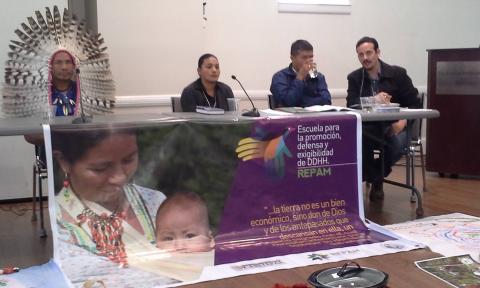
In March 2017, the Maryknoll Office for Global Concerns supported two delegations from Latin America who spoke at separate hearings at the Inter-American Commission on Human Rights in Washington, D.C. The following was published in the May-June 2017 issue of NewsNotes.
Two delegations addressed the plight of environmental human rights defenders at separate hearings at the Inter-American Commission on Human Rights on March 17. Both described ongoing threats to the right of communities to a fair and adequate consultation process when a development project is proposed in the area.
At the first hearing, indigenous and Afro-descendent activists from Panama spoke about their nearly twenty-year opposition to the Barro Blanco dam. We and the Sisters of Mercy of the Americas Institute Justice Team sponsored the hearing.
In the last year, communities opposing the Barro Blanco dam have faced violent oppression from the police. As the reservoir fills, some communities have been flooded and others left with little to no water at all.
Large-scale hydroelectric dams are a harmful source of renewable energy because they are energy-intensive to build, and destructive of riparian zones and the way of life of surrounding communities.
After hearing their testimony, the commissioners ruled that the government of Panama and the community activists need to enter into dialogue and find resolution by the end of the year. The first such meeting was held in Panama on March 27, and Maryknoll Sister Melinda Roper attended.
“My impression was that the atmosphere was one of clarity and openness on the part of almost all the people there to continue the process of dialog,” Sister Melinda said in an article about the meeting in the Global Sisters Report. The Global Sisters Report also published a series of articles on Panama and environmental human rights defenders.
The second hearing at the Inter-American Commission on Human Rights was sponsored by the Pan-Amazon Ecclesial Network, also known as REPAM. We, together with other Catholic groups, the Latin American Episcopal Conference, Caritas International, and the U.S. Conference of Catholic Bishops, supported the delegation of indigenous activists, peasants, and faith leaders who spoke about the right to consultation for indigenous peoples. We also organized a series of lobby visits for them to share their stories with policymakers and trainings to equip them in their advocacy back home.
The delegation included roughly 20 people from Brazil, Ecuador, Peru, and Colombia. Luis Sanchez, a Shuar indigenous leader, spoke about a Chinese company that is displacing indigenous communities in Southern Ecuador to extract copper. Sister Maria Angel from Spain accompanies Luis and the community in their advocacy efforts. She collaborates with the Ecumenical Center for Human Rights (CEDHU), of which Maryknoll Sister Elsie Monge is a founding member.
Rosildo da Silva, an indigenous leader from the Jaminawa tribe in Brazil, was there to represent the Jaminawa as well as other indigenous communities who do not have legal recognition of their territory. Together the communities oppose a large-scale REDD+ project (Reduction in Emissions from Deforestation and Degradation). REDD+ is a carbon trading scheme that allows wealthy countries to offset their carbon emissions by protecting forests. California is currently in negotiations with the state of Acre in Brazil to allow California to offset their emissions in exchange for the forest in Acre, where the Jaminawa live, to be left untouched.
The communities oppose this plan because it would require them to limit the sustainable use and relationship they have with the forest. Will they be able to forage or hunt for food? Will they receive enough compensation from Brazil’s Green Fund, which pays families not to cut down trees, to meet their basic needs? Will communities that haven’t had their land formally recognized by the state be given the right to consultation or to refuse the project?
Sister Digna Ochoa of Ecuador represented the indigenous communities around Yasuni National Park, deep in the Amazon. Yasuni is one of the most biodiverse hot spots in the world. Sister Digna is concerned about the expansion of oil drilling in the park, especially the risks to uncontacted indigenous communities there.
Zebelio Kayap represented the indigenous communities of Awajun and Wampis in Peru. They had filed a court case asserting their right to be consulted about an oil project in their territory. Already, the rivers have been polluted and the health of the community and the entire ecosystem has been compromised.
After they returned from Peru, the Catholic News Service reported that the Supreme Court in Peru ruled in favor of Awajun and Wampis. The court ruled that since Peru signed on to the International Labor Organization’s Convention 169 in 1996, all development projects since then must give indigenous communities the right to free prior and informed consent. The ruling could have implications for other indigenous communities with similar cases.
